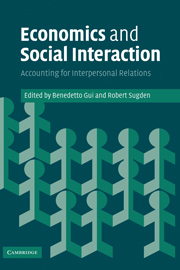Book contents
- Frontmatter
- Contents
- List of illustrations
- Notes on contributors
- Preface
- 1 Why interpersonal relations matter for economics
- 2 From transactions to encounters: the joint generation of relational goods and conventional values
- 3 Fellow-feeling
- 4 Interpersonal interaction and economic theory: the case of public goods
- 5 Under trusting eyes: the responsive nature of trust
- 6 Interpersonal relations and job satisfaction: some empirical results in social and community care services
- 7 On the possible conflict between economic growth and social development
- 8 The logic of good social relations
- 9 The mutual validation of ends
- 10 Hic sunt leones: interpersonal relations as unexplored territory in the tradition of economics
- 11 Authority and power in economic and sociological approaches to interpersonal relations: from interactions to embeddedness
- 12 Interpersonal relations and economics: comments from a feminist perspective
- 13 Economics and interpersonal relations: ruling the social back in
- Envoi
- References
- Index
5 - Under trusting eyes: the responsive nature of trust
Published online by Cambridge University Press: 15 December 2009
- Frontmatter
- Contents
- List of illustrations
- Notes on contributors
- Preface
- 1 Why interpersonal relations matter for economics
- 2 From transactions to encounters: the joint generation of relational goods and conventional values
- 3 Fellow-feeling
- 4 Interpersonal interaction and economic theory: the case of public goods
- 5 Under trusting eyes: the responsive nature of trust
- 6 Interpersonal relations and job satisfaction: some empirical results in social and community care services
- 7 On the possible conflict between economic growth and social development
- 8 The logic of good social relations
- 9 The mutual validation of ends
- 10 Hic sunt leones: interpersonal relations as unexplored territory in the tradition of economics
- 11 Authority and power in economic and sociological approaches to interpersonal relations: from interactions to embeddedness
- 12 Interpersonal relations and economics: comments from a feminist perspective
- 13 Economics and interpersonal relations: ruling the social back in
- Envoi
- References
- Index
Summary
(Razumov) Have I by a single word, look, or gesture given him reason to suppose that I accepted his trust in me?
Joseph Conrad (1998/1909, p. 45)Introduction
In his Under Western Eyes, first published in 1909, Joseph Conrad tells the story of Razumov, a solitary but well-respected young student, and of his charismatic colleague Victor Victorovitch Haldin. While Razumov is considered by his fellow students as reserved but reliable, Haldin has been classified as restless and unstable even by the local authorities. Razumov has a good reputation: a man who is always willing to help others, even at personal cost. Knowing this, one day Haldin knocks desperately on his door. Razumov lets him in. Haldin looks distraught; he immediately confesses his secret to Razumov: it was he who was responsible, that morning, for the act of terrorism against the carriage of Mr de P., the feared and brutal president of the notorious ‘repressive commission’. Razumov is horrified, first for the gravity of what has happened, but also because, knowing Haldin's secret, he too now is part of that tragic and dangerous conspiracy. Still shocked, he replies to Haldin's confession: ‘But pardon me, Victor Victorovitch. We know each other so little… I don't see why you…’ ‘Trust,’ replies Haldin. ‘This word’ – Conrad tells us – ‘sealed Razumov's lips as if a hand had been clapped on his mouth. His brain seethed with arguments’ (p. 5).
- Type
- Chapter
- Information
- Economics and Social InteractionAccounting for Interpersonal Relations, pp. 105 - 124Publisher: Cambridge University PressPrint publication year: 2005
- 7
- Cited by



